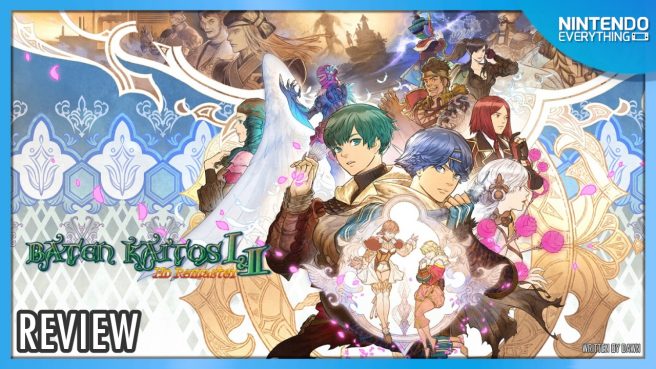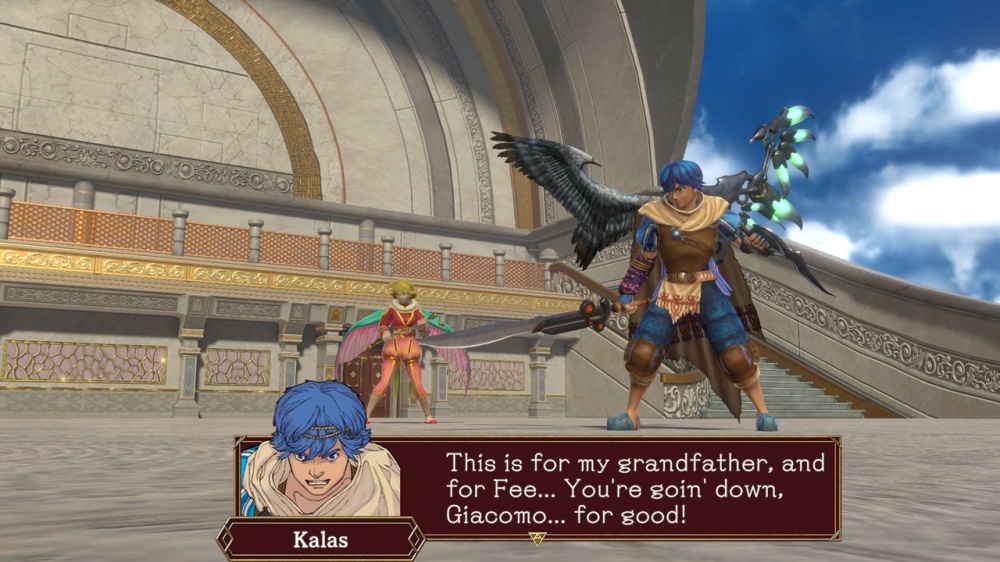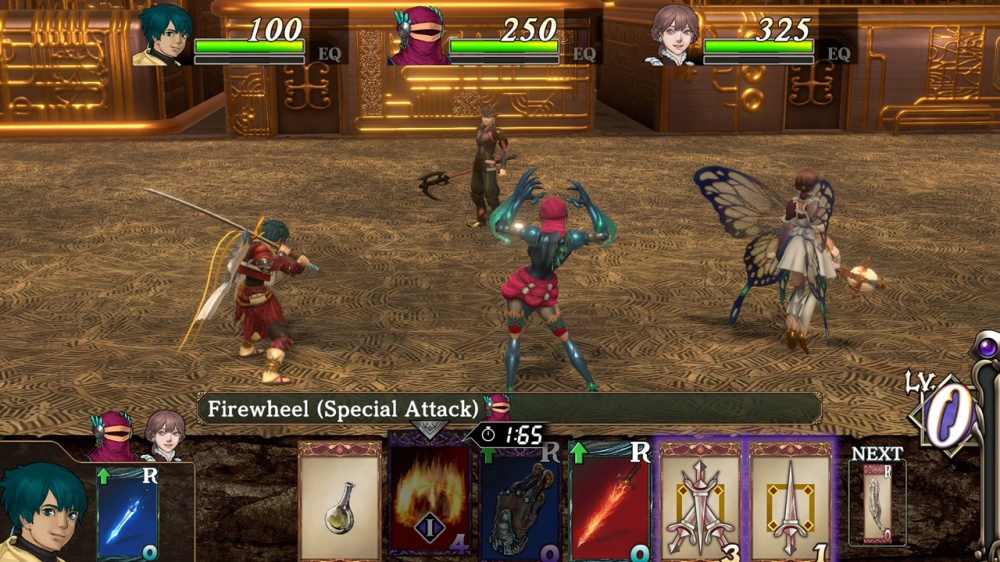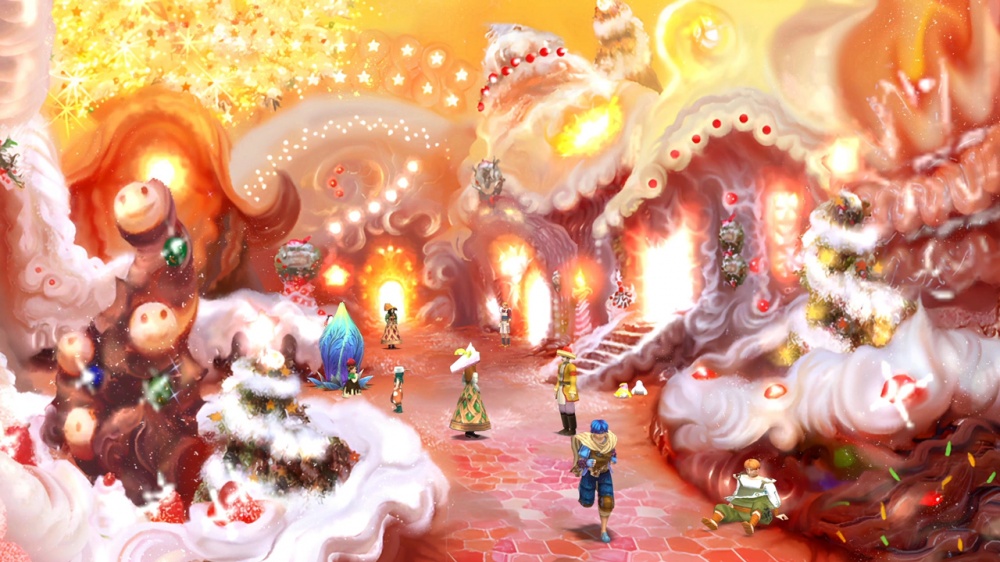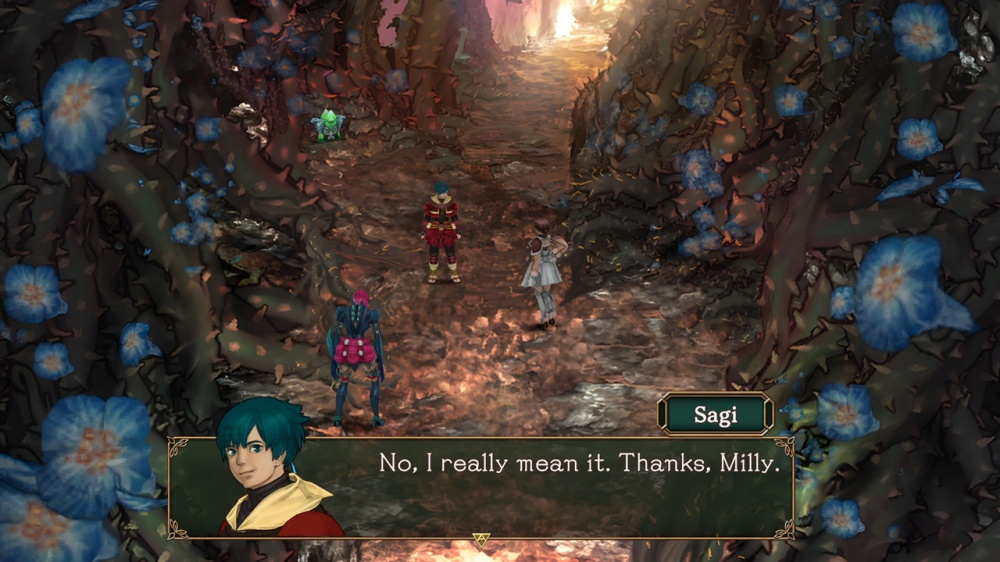System: Switch
Release date: September 14, 2023
Developer: Monolith Soft / tri-Crescendo / logicalbeat
Publisher: Bandai Namco
Those who knew of Monolith Soft before their rise to fame with Xenoblade Chronicles will no doubt know them for their work on Xenosaga instead. Few will have heard of Baten Kaitos: Eternal Wings and the Lost Ocean and its prequel Baten Kaitos Origins, two titles that were released in the early 2000s on the Gamecube and were generally well-received, but failed to make a lasting impact with sales, and were largely forgotten about beyond occasional rumors of a third game being in the works or canceled that would surface from time-to-time over the years. Baten Kaitos I & II HD Remaster brings these two games to the Switch with enhanced visuals and quality of life features, and while both games are a product of the times and beginning to show their age in places, they hold up remarkably well and are worth experiencing for any fans of Monolith Soft’s later titles.
Baten Kaitos I & II HD Remaster share the same setting, but tell vastly different stories. Eternal Wings and the Lost Ocean follows Kalas and his companions, who seek to collect the five End Magnus to stop the revival of Malpercio, an ancient and wicked god. Baten Kaitos Origins is a prequel set 20 years prior to the events of the first game, focusing on Sagi and his companions as they find themselves framed for murder, and thrust into the heart of a wider political conflict. Much like the first two Xenoblade titles, they are closely connected but sufficiently removed from one another that you can play either game first without missing anything of key importance, and knowledge of one game will enhance your appreciation of the other, with younger versions of key characters from Eternal Wings and the Lost Ocean appearing in Origins, and key concepts and worldbuilding being shared between both games.
In both games you play the role of a Guardian Spirit, an unseen and mostly unheard being, whose role is to guide the central protagonist on their journey. At points during the story the cast will interact with you directly in some slightly awkward, almost fourth-wall breaking scenarios, and you’re given the opportunity to respond, although your answers will only affect combat performance very slightly, and events will still play out as intended. Like many JRPGs the cast of Baten Kaitos is a mixed bag, and some will appeal to you more than others. Kalas in particular is not your usual protagonist, being rude and abrasive from the beginning, making him stand out even now as a character you’re either going to appreciate as a more unorthodox protagonist, or dislike immensely because his type of personality is usually reserved for a supporting party member or even a minor antagonist. Both he and Sagi have much deeper personalities than is immediately apparent, and characterisation in both games still shines through at key moments in the story and makes the cast more enjoyable, although in Eternal Wings and the Lost Ocean in particular the party members often feel like they’re together through circumstance rather than out of a shared goal.
Baten Kaitos I & II HD Remaster excels at worldbuilding, and the floating continents that serve as the setting for both titles are as diverse and creative now as they were when they first released two decades ago. From the picturesque tropics of Anuenue to the bizarre continent of Mira (which features a village made entirely out of sweets next to a dungeon that looks like it was taken straight out of a classic NES title) each location is visually memorable, and filled with secrets and sidequests to uncover in the way of many classic JRPGs that like to reward player curiosity. There is a high level of detail to the world that really shines with the remastered visuals, and there is a real sense of development in the locations that you visit in both titles, which brings the world to life.
From both a narrative and gameplay standpoint Magnus are one of the most important elements of Baten Kaitos I & II HD Remaster. Magnus are utilized for everything in-game from combat to puzzles, and while in modern times this is hardly a unique concept, it still stands out here as one of the more innovative elements of the games. As you journey through the lands you’ll come across various objects whose essence can be stored in the blank Magnus that you possess, which can then be used to interact with the environment, in puzzles, and in sidequests. Some Magnus will also change over time: for example a Banana Magnus, which can be used in combat to heal, will later turn into a Rotten Banana, which can be used to damage an opponent. One thing I appreciated about Eternal Wings and the Lost Ocean in particular is the Camera Magnus, which you can use in combat to take pictures of enemies, which can later be sold for money once they’ve fully developed, and also form a bestiary of sorts. Although this can make puzzles a little obtuse (more than once I had to look up what I needed to progress, because the game very rarely makes it obvious what you need or where to find it) it encourages exploration and interaction with the environment, and the result is often rewarding.
In both games the Magnus you’ll acquire are used to build decks which are used in combat, which play out in a turn-based style with ATB mechanics that require you to pick your cards within a few seconds or lose your turn. Each Magnus also has Spirit Numbers in its corners, and these can be chained together in combos for additional damage, which is a far greater factor in Origins. It’s a surprisingly involving system that makes battles challenging and engaging, as you will need to carefully assemble your deck from a variety of cards and plan your moves within the space of a few seconds. Both games have a very steep learning curve and erratic difficulty spikes, with even normal enemy encounters posing a very real threat and having the potential to wipe out your party if you’re not careful. Eternal Wings and the Lost Ocean is perhaps the more difficult of the two in this regard, as you will need to constantly adjust your deck to balance between multiple different types of Magnus and consider their Spirit Numbers to increase your likelihood of being able to pull off a successful combo.
The combat mechanics between the two games differ just enough that playing Origins first would not make Eternal Wings and the Lost Ocean feel like a significant downgrade, although as the more recent title it does feature some small improvements that make it a slightly more approachable game than its predecessor, where it is far too easy to brick on bad hands due to luck of the draw. Origins is more structured in its approach to combat and makes pulling off combos far easier with weak, medium, and strong attacks, but it lacks the flexibility of Eternal Wings and the Lost Ocean, where you can play cards in any order. Each game has their own unique elements to combat that will make them resonate differently with each player, although I personally found the first game more enjoyable due to its greater flexibility and my previous familiarity with it. Although you are healed after every encounter in Origins, fights tend to last longer and are especially difficult in its opening hours.
Several quality-of-life features have been implemented in Baten Kaitos I & II Remaster to make the games more streamlined and approachable. Through the pause menu you can toggle game speed and battle speed up to 300% faster, and you can also turn off random encounters, simplify battle results, and enable auto-battle and one-hit kills. I found 300% to be more of a hindrance than a help unfortunately, as I would often run straight into walls, but bringing game speed up to 200% makes them feel far less sluggish, at the cost of animations looking slightly odd at times as your characters whizz around the map at lightspeed.
Unfortunately the ability to increase battle speed is completely useless if you plan on playing through the games normally, due to the active-time elements in the combat that require you to pick your cards within a few seconds. Enemies will respawn after transitioning from one screen to the next, and even once you’re acclimatized to the game’s combat regular encounters can last several minutes, so being able to skip battles or win them instantly makes these games far more palatable, particularly in the case of the first game where you aren’t healed after every encounter. This also makes grinding for experience and new Magnus for your deck a far more streamlined experience.
But despite these quality of life features that make playing them much more bearable, both games are very much a product of their time, and a fresh coat of paint can only disguise so much of their now archaic design. Both games in Baten Kaitos I & II HD Remaster are a slow burn, and will likely require several hours of investment for most players before they really click. It can be particularly frustrating while you’re learning how the card-based combat works in the early hours, and the longer battles can feel like wars of attrition that come down entirely to luck of the draw. It’s very easy to brick on bad hands in the first game and be unable to act, which can be fatal in even regular encounters, and the faster pace and more structured nature of battles in the second game makes them far more challenging in general. Neither game will gradually ease you into its combat mechanics, and neither is particularly well-explained.
The soundtrack for Baten Kaitos I & II HD Remaster was composed by Motoi Sakuraba, famous for his work on the Tales and Star Ocean series, and his work here stands alongside his very best, featuring fantastic orchestral pieces punctuated by the occasional rock composition that bring the world to life and set the tone of each scene perfectly. Unfortunately the English dub for both games was removed for the release, and although the original game in particular is somewhat infamous for its English dub removing the voice acting for both titles is disappointing, and it robs the games of a little of their nostalgic value. It’s a small flaw in an otherwise excellent package, but one that could have easily been avoided by giving players that choice.
The Verdict

It takes time for all the disparate elements in Baten Kaitos I & II HD Remaster to come together, but once they do the results are what you would expect from Monolith Soft. The story takes dramatic and unexpected turns as characters reveal hidden depths, the world goes from standard RPG fare to diverse and often bizarre, and the combat goes from a technical mess to being strategic and immensely satisfying once you know how it all works. The quality of life features introduced in the remaster allow you to set your own pace, making grinding bearable where necessary, or removing it entirely to allow you to enjoy the story the games have to offer. The removal of the English dub is an unfortunate decision that makes these games feel somewhat incomplete, but is a small absence in what is otherwise a perfectly presented package of two of Monolith Soft’s most overlooked titles that are just as deserving of your time and attention as their more recent works.
Baten Kaitos I & II HD Remaster copy provided by the publisher for the purposes of this review.
